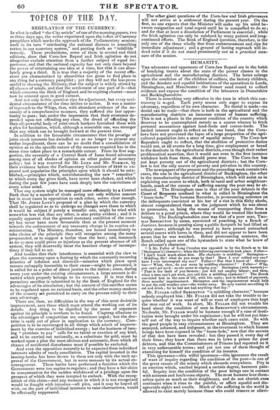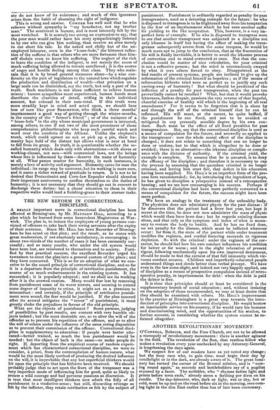HUMANITY.
THE advocates and opponents of Corn-law Repeal are in the habit of bandying taunts about the state of the poorer classes in the agricultural and the manufacturing districts. The latter enlarge upon the condition of the children of colliers, the factory children, and the desolate and squalid habitations of the operatives in Leeds, Birmingham, and Manchester : the former send round to collect evidence and expose the condition of the labourers in Dorsetshire and Buckinghamshire.
There is something very offensive in the tone in which this con- troversy is waged. Each party seems only eager to expose its adversary, regardless of its own character. No denial is made—no denial can be made—that there is both in the agricultural and the manufacturing districts an immense extent of human suffering. This is not a phasis in the present condition of the country which deserves to be contemplated merely as a source whence to fetch personal accusations against land-lords and cotton-lords. The landed interest ought to reflect on the one hand, that the Corn- laws have not prevented the lapse of a large proportion of the agri- cultural population into a state of squalid misery. The Corn-law Repealers ought to reflect, that the abolition of protective duties would not, at all events for a long time, give employment or bread to the destitute in the agricultural districts, even though their rather problematical assertion, that it would not even in the first instance withdraw both from them, should prove true. The Corn-law has not kept poverty out of the agricultural districts ; but the Corn- law is not the only source of poverty and privation in this country.
The newspapers of the present and the preceding week contain two cases, the one in the agricultural district of Buckingham, the other in the manufacturing district of Birmingham, which will assist us in explaining one source to which, both in rural and urban neighbour- hoods, much of the excess of suffering among the poor may be at- tributed. The Birmingham case is that of the poor debtors in the Court of Requests confined in what is called in Birmingham the "louse-hole." The humane Recorder, in pronouncing sentence on the delinquents convicted at his bar of a riot in this filthy abode, almost congratulated them on the judgment which he was about to pronounce, as being the means of transporting them from a debtors to a penal prison, where they would be treated like human beings. The Buckinghamshire case was that of a poor man, THO- MAS SHRIMPTON by name, convicted of poaching, by a Bench of Justices, because in passing along a public footpath he had lifted an empty snare ; although he was proved to have passed untouched several snares with hares in them, and did not appear to have been aware that he was watched. Before pronouncing sentence, the Bench called upon one of the bystanders to state what he knew of the prisoner's character. "A. Mr. Fuller of Long Crendon was appealed to by the Bench as to his [Shrimpton's] character ; when the following conversation took place. Fuller- ' I don't know much about him. His character is middling.' Shrimpton- ' Middling, Sir what do you mean by that? Have I ever robbed any one? have I ever interrupted any one ?' Fuller—, Not that I know of.' Shrimp- ton—' What, then, do you mean by middling character? ' Fuller—' Why, you can't get work : no one seems to employ you.' Shrimpton (with warmth)— 'That is the fault of you farmers : you will not employ labour; and then, when a man can't get work, you call him a middling character!' The Bench convicted him in the sum of 101., with 10s. costs ; and in default of payment, three months' imprisonment. Shrimpton said the imprisonment would help to put the cold weather over—the winter away. He only wanted something to eat and drink ; for he had not had anything that day."
Mr. FULLER called SHRIMPTON "a middling character," because nobody employed him : Mr. FULLER did not take the trouble to in- quire whether it was want of will or want of employers that kept the man out of work. In short, Mr. FULLER did not trouble his head about the condition of men in SHRIMPTON'S circumstances. No doubt, Mr. FULLER would be humane enough if a case of desti- tution were brought under his cognizance ; but he will not put him- self out of the way to inquire whether such cases exist. So with the good people in easy circumstances at Birmingham. They are annoyed, ashamed, and indignant, at the treatment to which human beings have been exposed in the "louse-hole," now that the secrets of that den have been revealed : but they passed it every day of their lives ; they knew that there was in town a prison for poor debtors, and that the Commissioners of Prisons had reported on it in very unfavourable terms; and yet not one of them thought of examining for himself the condition of its inmates.
This ignorance—this wilful ignorance—this ignorance the result of want of inquiry regarding the condition of the poor—is one of the great causes of the misery which abounds everywhere. Pity is an emotion which, excited beyond a certain degree, becomes pain- ful. Inquiry into the condition of the poor brings one in contact with noisome and loathsome objects. The most humane love them- selves quite as much as their neighbours, and do not cherish even sentiment when it rises to the painful, or affect squalid and dis- agreeable sights and smells. Much of the suffering in the world is allowed to exist merely because those who could remove or allevi- ate do not know of its existence ; and much of this ignorance arises from the habit of shunning the sight of indigence.
This is wrong and unwise. COWPER has well said that he who relieves without sympathy is "my benefactor, not my brother man." The sentiment is human, and is most intensely felt by the most wretched. It is scarcely too strong an expression to say, that the poor man would rather have his story sympathizingly listened to by one who can give him nothing, than receive an alms merely to cut short his tale. In the naked and chilly hut of the un- employed labourer, even in the "louse-hole," the bitterest reflec- tion of the sufferer is that others who are more fortunate than him- self disdain even to know his suffering. The neglect of the rich to learn the condition of the indigent, is not merely the cause of much suffering being allowed to remain unrelieved ; it is the source of angry and hostile feeling among that class. They who main- tain that it is by broad general measures alone—by a wise con- formity on the part of legislators to the natural laws which regulate the production and distribution of wealth—that privation on a large scale can be diminished, say the truth, but only a part of the truth. Such machinery is not alone sufficient to relieve human misery : human sympathies must superintend, human hands must distribute the charities of detail, trifling in their individual amount, but colossal in their sum-total. If this truth were more steadily kept in mind and acted upon, we should hear less of men like poor SHRIMPTON, who think a three months' imprisonment a good way of getting through the winter-months, in the country of the "farmer's friend" ; or of the nuisance of a " louse-bole " in the city whose municipal government is intrusted, among others, to one if not two of the most prominent of those comprehensive philanthropists who keep such careful watch and ward over the comforts of the African. Unlike the elephant's trunk, which could uproot an oak or pick up a pin, their hu- manity lays hold of the distant but allows what is near at hand to fall from its grasp. In truth, it is questionable whether the so- called humanity which deals only with abstractions—with slaves or working-classes, not men—with economical laws, not the beings whose fate is influenced by them—deserve the name of humanity at all. What passes muster for humanity, in such instances, is merely a love of activity and argument. Humanity cares for man the individual : its range may be narrower, but its working is more sure, and it earns a richer reward of gratitude in return. It is not to be desired that Protectionist and Corn-law Repealer should abandon their important controversy to confine themselves to the duties of humanity ; it is not necessary that they should go out in concert to discharge these duties : but a closer attention to them in their respective walks would lend a finishing-grace to their .sterner tasks.



























 Previous page
Previous page